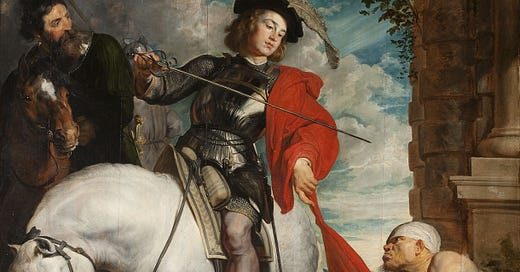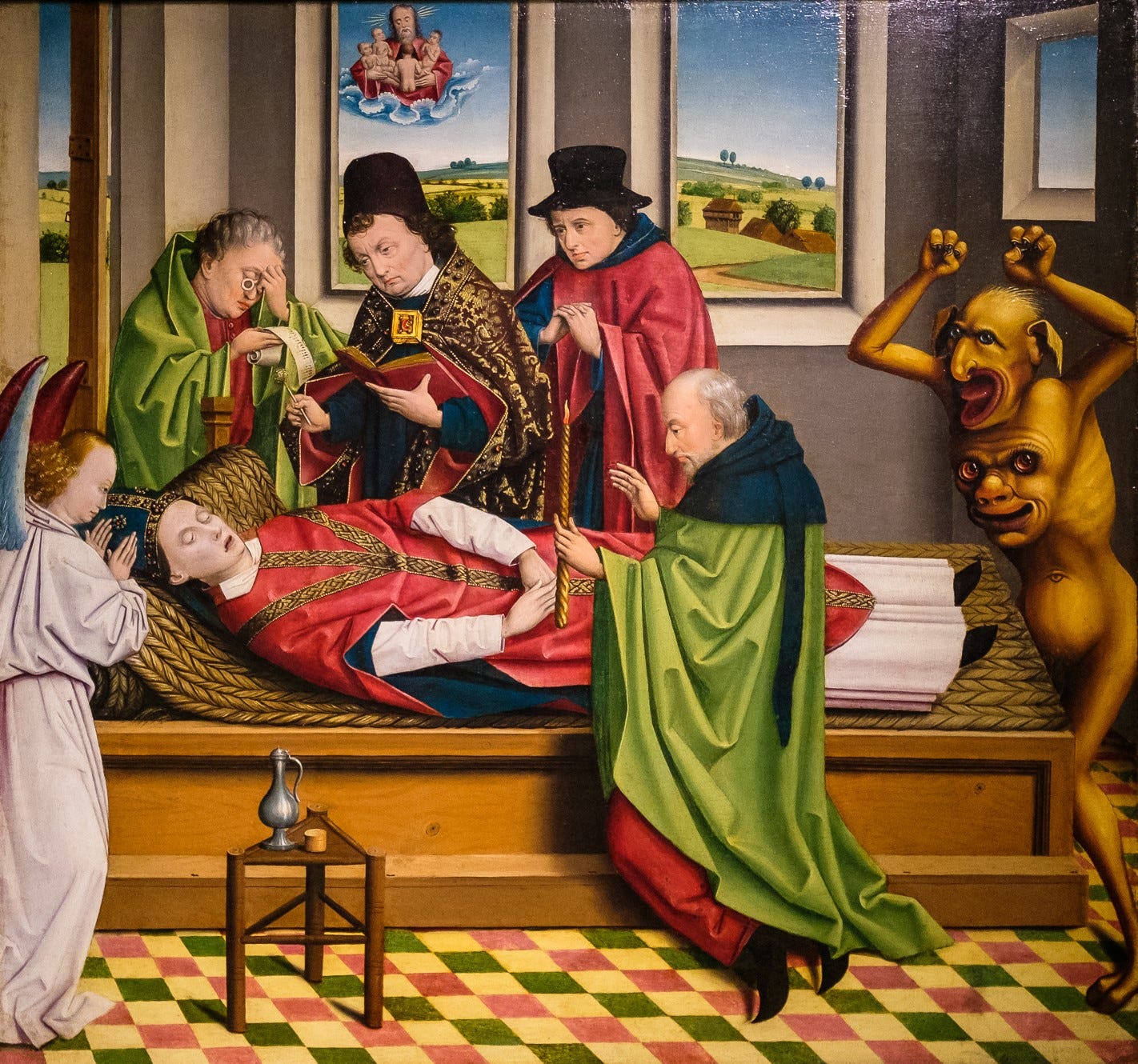St. Martin of Tours was revered for his piety, humility, and charitable works. Born around 316 AD in Sabaria, Pannonia (present-day Hungary), he grew up in a family of pagan beliefs. However, at the age of ten, Martin embraced Christianity, much to the dismay of his parents.
As a young man, Martin joined the Roman imperial army, following in his father's footsteps. Despite his reluctance to fight, he quickly rose through the ranks due to his bravery and leadership skills. One winter evening, while stationed in Amiens, Martin came across a poor beggar shivering in the cold. Moved by compassion, Martin cut his own cloak in half and shared it with the beggar. That night, Martin had a vision of Jesus Christ wearing the same cloak he had given away. This experience profoundly affected Martin, leading him to renounce violence and seek baptism.
After leaving the army, Martin traveled to Tours, France, where he met Bishop Hilary of Poitiers, a champion of orthodox Christianity. Under Hilary's guidance, Martin studied Scripture and deepened his faith. Eventually, Martin founded a monastery near Tours, which became a center of spiritual life and learning.
In 371 AD, Martin was appointed Bishop of Tours against his will. As bishop, Martin continued to live simply and serve the poor. He established hospices, orphanages, and churches throughout his diocese, earning widespread admiration for his kindness and generosity.
St. Martin of Tours is perhaps best remembered for his famous encounter with the devil. While traveling, Martin stumbled upon a group of pagans performing sacrificial rituals. To stop them, Martin drew his sword and threatened to destroy their altars unless they stopped worshiping false gods. The terrified pagans fled, leaving behind their sacred ox. The devil appeared to Martin in anger, claiming ownership of the ox and demanding that Martin return it. Martin refused, declaring that if the animal was indeed Satan's property, he would rather die than give it back. Unwilling to harm Martin, the devil retreated, leaving the ox behind.
[W]hen in a certain village he had demolished a very ancient temple, and had set about cutting down a pine-tree, which stood close to the temple, the chief priest of that place, and a crowd of other heathens began to oppose him; and these people, though, under the influence of the Lord, they had been quiet while the temple was being overthrown, could not patiently allow the tree to be cut down.
-Sulpicius Severus 1894, ch. xiii
Martin's reputation as a holy man spread far and wide, inspiring countless conversions. He died on November 8, 397 AD, surrounded by his fellow monks and friends. His tomb in Tours became a major pilgrimage site, and his legacy continues to influence Catholic teachings and traditions today.
The life and teachings of St. Martin of Tours offer valuable lessons for contemporary Christians. Firstly, Martin's conversion story highlights the transformative power of God's grace. Like Martin, we too can experience a dramatic change of heart when we open ourselves to the love and mercy of God. Secondly, Martin's commitment to serving others demonstrates the importance of living out our faith through acts of charity and selflessness. Lastly, Martin's courageous stand against pagan practices encourages us to remain steadfast in our beliefs, even in the face of opposition or persecution.
St. Martin of Tours serves as a model of authentic Christian living. Through his example, we learn how to embrace poverty, show compassion to those in need, and boldly proclaim our faith without fear. May we continue to draw inspiration from this remarkable saint, seeking to follow in his footsteps as we journey towards union with God.
Sulpicius Severus Account of St. Martin’s Miracle of the Dead Man
But, after the lapse only of a few days, the catechumen, seized with a languor, began to suffer from a violent fever. It so happened that Martin had then left home, and having remained away three days, he found on his return that life had departed from the catechumen; and so suddenly had death occurred, that he had left this world without receiving baptism. The body being laid out in public was being honored by the last sad offices on the part of the mourning brethren, when Martin hurries up to them with tears and lamentations. But then laying hold; as it were, of the Holy Spirit, with the whole powers of his mind, he orders the others to quit the cell in which the body was lying; and bolting the door, he stretches himself at full length on the dead limbs of the departed brother. Having given himself for some time to earnest prayer, and perceiving by means of the Spirit of God that power was present, he then rose up for a little, and gazing on the countenance of the deceased, he waited without misgiving for the result of his prayer and of the mercy of the Lord. And scarcely had the space of two hours elapsed, when he saw the dead man begin to move a little in all his members, and to tremble with his eyes opened for the practice of sight. Then indeed, turning to the Lord with a loud voice and giving thanks, he filled the cell with his ejaculations. Hearing the noise, those who had been standing at the door immediately rush inside. And truly a marvelous spectacle met them, for they beheld the man alive whom they had formerly left dead. Thus being restored to life, and having immediately obtained baptism, he lived for many years afterwards; and he was the first who offered himself to us both as a subject that had experienced the virtues of Martin, and as a witness to their existence.
-Sulpicius Severus 1894
A letter of Sulpicius Severus
Martin was poor and humble
Martin knew long in advance the time of his death and he told his brethren that it was near. Meanwhile, he found himself obliged to make a visitation of the parish of Candes. The clergy of that church were quarrelling, and he wished to reconcile them. Although he knew that his days on earth were few, he did not refuse to undertake the journey for such a purpose, for he believed that he would bring his virtuous life to a good end if by his efforts peace was restored in the church.
He spent some time in Candes, or rather in its church, where he stayed. Peace was restored, and he was planning to return to his monastery when suddenly he began to lose his strength. He summoned his brethren and told them he was dying. All who heard this were overcome with grief. In their sorrow they cried to him with one voice: “Father, why are you deserting us? Who will care for us when you are gone? Savage wolves will attack your flock, and who will save us from their bite when our shepherd is struck down? We know you long to be with Christ, but your reward is certain and will not be any less for being delayed. You will do better to show pity for us, rather than forsake us.”
Thereupon he broke into tears, for he was a man in whom the compassion of our Lord was continually revealed. Turning to our Lord, he made this reply to their pleading: “Lord, if your people still need me, I am ready for the task; your will be done.”
Here was a man words cannot describe. Death could not defeat him nor toil dismay him. He was quite without a preference of his own; he neither feared to die nor refused to live. With eyes and hands always raised to heaven he never withdrew his unconquered spirit from prayer. It happened that some priests who had gathered at his bedside suggested that he should give his poor body some relief by lying on his other side. He answered: “Allow me, brothers, to look towards heaven rather than at the earth, so that my spirit may set on the right course when the time comes for me to go on my journey to the Lord.” As he spoke these words, he saw the devil standing near. “Why do you stand there, you bloodthirsty brute?” he cried. “Murderer, you will not have me for your prey. Abraham is welcoming me into his embrace.”
With these words, he gave up his spirit to heaven. Filled with joy, Martin was welcomed by Abraham. Thus he left this life a poor and lowly man and entered heaven rich in God’s favor.
Today’s Mass Collect for St. Martin of Tours
O God, who are glorified in the Bishop Saint Martin both by his life and death, make new, we pray, the wonders of your grace in our hearts, that neither death nor life may separate us from your love.
Through our Lord Jesus Christ, your Son, who lives and reigns with you in the unity of the Holy Spirit, God, for ever and ever.






